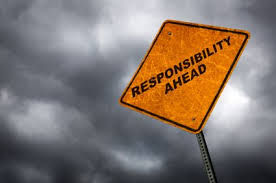Accountability: Where is the Board of Directors?
 Compliance professionals like to emphasize that accountability is essential to create an ethical culture. There is no question that if a company does not hold anyone accountable for ethics and compliance issues a company is unlikely to foster a meaningful culture.
Compliance professionals like to emphasize that accountability is essential to create an ethical culture. There is no question that if a company does not hold anyone accountable for ethics and compliance issues a company is unlikely to foster a meaningful culture.
To put it another way, if senior management is not held accountable for their actions or failures to act, then it is hard to push accountability as a meaningful corporate value. When companies punish or withhold rewards from mid-level managers and employees, and fail to hold anyone accountable at the senior management level, corporate morale is sure to suffer. Disparate justice and consequences is a powerful negative force that only emboldens cynics within an organization.
The danger of unaccountable officers was demonstrated with the GM fiasco. As regular readers can tell, the GM controversy is an important reminder of the importance of a number of basic ethics and compliance principles.
GM’s General Counsel claims he did not know about the faulty ignition switch issue, even though several senior attorneys were intimately involved in the day-to-day management of the issue. Whether or not GM’s General Counsel knew about the issue or not, he should have been held accountable by the CEO and fired under either rationale.
Given the importance of corporate accountability, it strikes me that, in many situations, the concept of accountability should stretch all the way to the company’s board. If corporate boards are to required to exercise proper governance functions and oversight responsibilities, in many cases the buck should stop with the corporate board itself. It is not enough to argue that a corporate board was kept in the dark in the issue.
To me, in the face of a corporate scandal, the corporate board has to be asked what did they know and when did they know it? (Just like the famous series of questions Sen. Baker asked about President Nixon during the Watergate scandal). If the board was not aware of an issue, the question has to be asked why they did not know about the issue?
The question should filter down throughout an organization – if the CEO did not know about an issue, why not?; if the Chief Compliance Officer did not know about an issue, why not? And so on – you get the point.
I always say that every FCPA violation involves some breakdown in corporate governance and oversight at the board level. I am not being naïve to think that a corporate board should exercise its oversight responsibilities with appropriate regard for risk, potential violations, and monitoring obligations. In today’s enforcement environment, these are minimum requirements.
In the face of corporate scandals, senior managers immediately duck and cover in order to survive allegations of wrongdoing within the company. Senior management knows better. The corporate board has to do some soul-searching about its own functions and conduct before it has any credibility in reviewing the role of senior managers.
 The Justice Department is committed to holding a corporate board and senior managers accountable for corporate misconduct. They are itching to find the right facts where they can prosecute a board member and a CEO for either engaging in, or turning a blind eye away from, corporate misconduct.
The Justice Department is committed to holding a corporate board and senior managers accountable for corporate misconduct. They are itching to find the right facts where they can prosecute a board member and a CEO for either engaging in, or turning a blind eye away from, corporate misconduct.
Corporate boards already understand the increasing risks. It is time for them to step up, accept a greater level of accountability and exercise their oversight function in a responsible and effective manner. That means asking the tough questions, demanding greater accountability from themselves and senior managers, and eventually pushing for consistent and appropriate steps to prevent code and legal violations.















